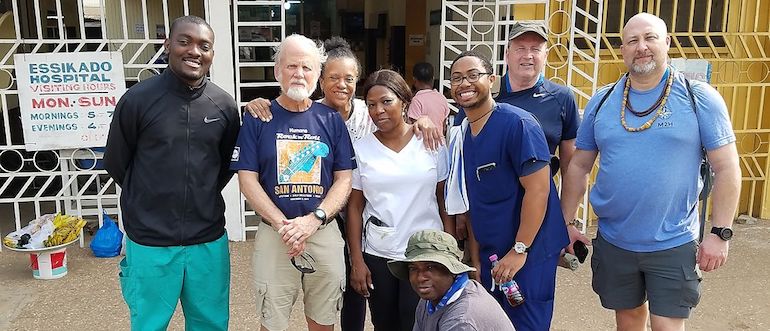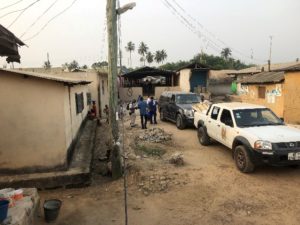
Ghana 2018: David’s Reflection
by David Jennette, CSA
The West-African nation of Ghana is one with limited access to health care, and thus, a major reason I decided to join Mission to Heal’s exercise there this past February. During my visit, our team of health care providers, in collaboration with the Dr. Grace Ayensu-Danquah, and the Helping Hands Organization, was able to provide free medical care to over 400 Ghanaians from the rural villages around Essikado during our brief visit. These villages warmly welcomed our team, enabling us to provide care through general consultations, and surgical interventions, all the while being immersed into Ghanaian culture.
My attraction to M2H was its focus on surgical intervention; however, this mission presented with only a small fraction of surgical cases from our screenings. Nonetheless, spending a mere five to ten minutes screening each patient, I began to understand the great need for health care in this village. More than this realization, however, I began to put faces and individual stories on this need. I can recall seeing a 12-year-old boy who had grown up barely being able to see, leaving him unable focus in the classroom. Ultimately, this handicap left him withdrawn from the village, as his parents and villagers did not know how to care for him except by keeping close watch over him. With a few minutes of examination and eyeglass fitting, a donated pair of reader glasses gave him a cure. Immediately, this kid was given the gift of better vision, leaving him full of smiles, eager to read, and words of gratitude for our help.
 A 16-year old girl had come to our makeshift screening clinic seeking answers about a mass that had been growing on her forehead. As with many other Ghanaians, her fears and the fact that her family could not afford to seek medical care kept her from addressing this mass. The mass was the size of golf ball and she worried that her family and the village “Witch Doctor” would never be able to rid her of this shaming growth.
A 16-year old girl had come to our makeshift screening clinic seeking answers about a mass that had been growing on her forehead. As with many other Ghanaians, her fears and the fact that her family could not afford to seek medical care kept her from addressing this mass. The mass was the size of golf ball and she worried that her family and the village “Witch Doctor” would never be able to rid her of this shaming growth.
News of the arrival of our medical team persuaded this young girl to travel several miles on foot to reach our clinic in Essikado. At the start of the surgery, the young girl was instructed to keep still while the incision was made. Discovering that this tumor was a benign lipoma, we easily removed it, and within minutes, this girl’s fear was replaced by the hope of leading the life of a normal 16-year old girl, a hope that illuminated her face after she felt her tumor-less forehead for the first time.
As we had only local anesthesia to administer for the surgeries, patients endured much more pain than if they had been treated in a hospital. With each patient presenting with a different surgical case, ranging from a routine hernia repair to the removal of lipomas and sebaceous cysts, our medical team was able to provide relief of pain and discomfort that these patients had endured for years. Finally, these individuals had hope that they could lead a normal life, resuming their daily activities as they had prior to their medical problem. Through these interventions, we were able to demonstrate not only our skills learned through our medical experience, but also our passion for helping others.
Beyond caring for others, I was able to understand the ways that culture is intertwined with health. These Ghanaian villages and their people demonstrated the nexus of culture and health and enabled me to see these patients as individuals rather than clinical cases. Just as promised, this trip enabled me to be part of a team providing care to Ghanaians; but, unexpectedly, gave me an awareness of human complexities and a passion for global health that will forever stay on my mind.
